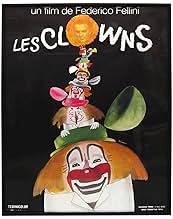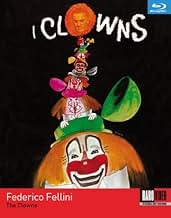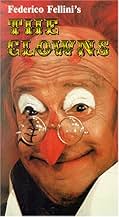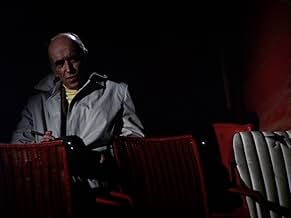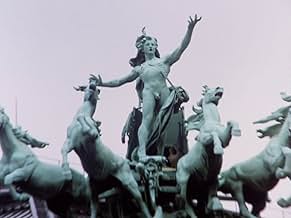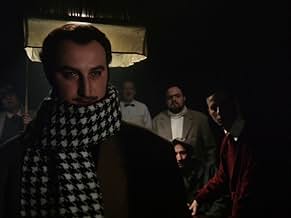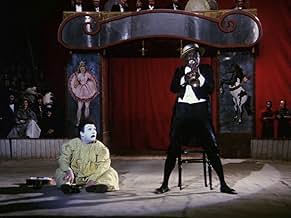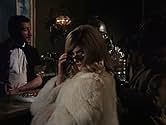AVALIAÇÃO DA IMDb
7,0/10
3,2 mil
SUA AVALIAÇÃO
Muitas memórias reais e documentário falso, enquanto Fellini explora uma obsessão infantil: palhaços de circo.Muitas memórias reais e documentário falso, enquanto Fellini explora uma obsessão infantil: palhaços de circo.Muitas memórias reais e documentário falso, enquanto Fellini explora uma obsessão infantil: palhaços de circo.
- Direção
- Roteiristas
- Artistas
- Prêmios
- 4 vitórias e 2 indicações no total
Riccardo Billi
- Clown
- (as Billi)
Gigi Reder
- Clown
- (as Reder)
Tino Scotti
- Clown
- (as Scotti)
Carlo Rizzo
- Clown
- (as Rizzo)
Alberto Colombaioni
- Clown
- (as I 4 Colombaioni)
Giacomo Furia
- Clown
- (as Furia)
Dante Maggio
- Clown
- (as Maggio)
Galliano Sbarra
- Clown
- (as Sbarra)
Peppino Janigro
- Clown
- (as Janigro)
Nino Terzo
- Clown
- (as Terzo)
Osiride Pevarello
- Clown
- (as Peverello)
- Direção
- Roteiristas
- Elenco e equipe completos
- Produção, bilheteria e muito mais no IMDbPro
Avaliações em destaque
The Clowns might be the most wonderfully experimental of the obscure Federico Fellini films. Now depressingly only available on shoddy old videos from the 1980s (where, unintentionally on Fellini's part, the film skips a couple of times in jump cuts), it remains a testament to one of the director's life-long obsessions: the depravity, the joy, the delirium, and the choreography of the circus, particularly clowns in this case.
He opens the film with a particular image- a child watches outside his window as the circus tent is erected up, as if it were rising up from the ground like a tree- and then goes head-first into a circus performance. While it shouldn't be very funny, somehow it is, extremely so, in all the silliest ways that are partly Fellini in the timing of the shots and how buoyant the camera goes, and in the Nino Rota score (which, by the way, borrows from all the standards of circus fare, and as self-referentiality is the name of the game from 8 1/2 in the Wagner choice), and partly from the clowns themselves.
After a quick kaleidoscope view of a neighborhood with certain citizens, like a pool-hall man who's kind except for when he goes into a crazy state once in a while and acts like he's in war, Fellini changes gears, though not exactly. Like Herzog, and just as personally, we see a form of a documentary take shape, and not really at the same time. Fellini seems to be making a documentary on clowns, the history of them, interviews with the old masters from France and Italy and Germany, and visiting what remains of the great old sites and rare silent film reels. But then we see the camera is shooting *them* (them being the crew) shooting the documentary, and not in a usual documentary way: it's still a 'Fellini' film, meaning it has the self-indulgence of Fellini's narration, the dialog sometimes colliding into what the last person said, and in sweet gliding camera movements that seem to be flying on air.
What happens from this is that what could be just sheer indulgent flair turns into a creatively self-conscious work of personal film-making; we all know how wrapped up Fellini is in all of this, and without calling too much attention to it he's relaxed and humorous about it. See the great moment, in the midst of the climax, when he cuts to himself, being interviewed by some journalist, asked what is the 'message' he wants to convey with this film, and immediately after this buckets fall on Fellini and the journalists' heads. And as Fellini is technically doing a documentary, we get a superb whirlwind of showing and telling on the part of the clowns. We see them at how they work, with tigers and with big props, the midgets, the eternal pranksters, and how they look back on their times (one says he just can't look back anymore).
But what's most brilliant is how Fellini kind of answers his own hypothesis, which he comes to after viewing an all-too-short silent film of the clown Remy- that the circus is dead- by having a twenty-five minute long sequence where clowns deal with death, the widows, the resurrection, and just pure celebration. By the time it reaches its apex we're in the midst of one of the grandest of Fellini's orchestrated acts of abstract art, where clowns are running amok, the 'special effects' are going to a point (won't that 'horse' get in place!), and Rota's music seems to be going so fast one might see him off-screen with Fellini as his hands are on fire.
So why not a masterpiece? It is, in a sense, great more as a minor work than as something towering in the cinematic consciousness like La Dolce Vita or 8 1/2. It's also a little difficult to judge it as it now stands in its deteriorated state, as ten seconds of film in different spots seems to be jettisoned. But it is essential viewing for any Fellini fan, and for anyone who loves the circus as much as he does. And for someone like myself, who occasionally finds clowns a little too creepy and wacky for their own good, Fellini's contribution, however brief it is in 93 minutes, is unequivocal.
He opens the film with a particular image- a child watches outside his window as the circus tent is erected up, as if it were rising up from the ground like a tree- and then goes head-first into a circus performance. While it shouldn't be very funny, somehow it is, extremely so, in all the silliest ways that are partly Fellini in the timing of the shots and how buoyant the camera goes, and in the Nino Rota score (which, by the way, borrows from all the standards of circus fare, and as self-referentiality is the name of the game from 8 1/2 in the Wagner choice), and partly from the clowns themselves.
After a quick kaleidoscope view of a neighborhood with certain citizens, like a pool-hall man who's kind except for when he goes into a crazy state once in a while and acts like he's in war, Fellini changes gears, though not exactly. Like Herzog, and just as personally, we see a form of a documentary take shape, and not really at the same time. Fellini seems to be making a documentary on clowns, the history of them, interviews with the old masters from France and Italy and Germany, and visiting what remains of the great old sites and rare silent film reels. But then we see the camera is shooting *them* (them being the crew) shooting the documentary, and not in a usual documentary way: it's still a 'Fellini' film, meaning it has the self-indulgence of Fellini's narration, the dialog sometimes colliding into what the last person said, and in sweet gliding camera movements that seem to be flying on air.
What happens from this is that what could be just sheer indulgent flair turns into a creatively self-conscious work of personal film-making; we all know how wrapped up Fellini is in all of this, and without calling too much attention to it he's relaxed and humorous about it. See the great moment, in the midst of the climax, when he cuts to himself, being interviewed by some journalist, asked what is the 'message' he wants to convey with this film, and immediately after this buckets fall on Fellini and the journalists' heads. And as Fellini is technically doing a documentary, we get a superb whirlwind of showing and telling on the part of the clowns. We see them at how they work, with tigers and with big props, the midgets, the eternal pranksters, and how they look back on their times (one says he just can't look back anymore).
But what's most brilliant is how Fellini kind of answers his own hypothesis, which he comes to after viewing an all-too-short silent film of the clown Remy- that the circus is dead- by having a twenty-five minute long sequence where clowns deal with death, the widows, the resurrection, and just pure celebration. By the time it reaches its apex we're in the midst of one of the grandest of Fellini's orchestrated acts of abstract art, where clowns are running amok, the 'special effects' are going to a point (won't that 'horse' get in place!), and Rota's music seems to be going so fast one might see him off-screen with Fellini as his hands are on fire.
So why not a masterpiece? It is, in a sense, great more as a minor work than as something towering in the cinematic consciousness like La Dolce Vita or 8 1/2. It's also a little difficult to judge it as it now stands in its deteriorated state, as ten seconds of film in different spots seems to be jettisoned. But it is essential viewing for any Fellini fan, and for anyone who loves the circus as much as he does. And for someone like myself, who occasionally finds clowns a little too creepy and wacky for their own good, Fellini's contribution, however brief it is in 93 minutes, is unequivocal.
This little film tends to stand quietly in the shadows of the great director's other works. It cannot compare to 8 1/2, or La Dolce Vita, but it carries a remarkable quality to it that isn't quite like his other films.
Fellini's circus theme is used here to a remarkable effect. There is a sadness that creeps in and around the film, like a cat watching a canary. It is unlike his other works, not as daring or bold, but worth some consideration.
Fellini's circus theme is used here to a remarkable effect. There is a sadness that creeps in and around the film, like a cat watching a canary. It is unlike his other works, not as daring or bold, but worth some consideration.
I had never seen this wonderful film before. I was aware that it had been made for TV, was about clowns, obviously and I had heard reports of terrible picture and sound. So, my blu-ray has been sitting around for some time until, prompted by a viewing of Fellini's first success, we decided to give this a go. It is fantastic. Clearly the quality issues have been dealt with and it would seem that the TV origins meant nothing. If the director was taking it easy after Satyricon, you could have fooled me. This has a magical and majestic extended opening sequence and an astonishing extended ending but in-between it is still all a swirl of exciting, amusing and emotional cinematic wonder. Ostensibly a documentary (we even see the director seemingly working with his crew) but there are illusions upon illusions and even the lovely interviews with elderly historic clowns from back in the day are so woven within the circus tapestry that reflects Fellini's past films, future films and his life itself, that we simply gasp and sigh as we share the maestro's own obvious delight.
Fellini exposes his great attraction for the clowns and the world of the circus first recalling a childhood experience when the circus arrives nearby his home. Then he joins his crew and travel from Italy to Paris chasing the last greatest European clowns still live in these countries. He also meets Anita Ekberg trying to buy a panther in a circus.
The overrated "I Clowns" is the weakest movie of Fellini that I have ever seen. This documentary is an absolutely personal and boring homage to the clowns and the world of the circus. Maybe Fellini had had a great satisfaction in this tribute since the theme was his childhood obsession; however I found it extremely painful to hear and watch after thirty minutes. If this documentary was a short, it could be more watchable. My vote is four.
Title (Brazil): "Os Palhaços" ("The Clowns")
The overrated "I Clowns" is the weakest movie of Fellini that I have ever seen. This documentary is an absolutely personal and boring homage to the clowns and the world of the circus. Maybe Fellini had had a great satisfaction in this tribute since the theme was his childhood obsession; however I found it extremely painful to hear and watch after thirty minutes. If this documentary was a short, it could be more watchable. My vote is four.
Title (Brazil): "Os Palhaços" ("The Clowns")
10EdgarST
A sentimental journey shot in France and Italy, searching the trace of the great clowns of yesterday, by one of the few filmmakers that showed his love for these performers in his own films, an affection that dates from a childhood experience in his hometown Rimini, which is lovingly recreated in the dream-like opening scene. Made for Italian television, the film shows Fellini meeting a few survivors, talking to clowns' relatives and friends, visiting white clowns, and recreating the style of the old art, as the funeral of a famous clown, that closes the documentary. He even finds and films Anita Ekberg, the star of his 1960 masterpiece, "La dolce vita" (I always thought he saw her a bit as a joke); but what I find curious is that his film crew seems to be integrated by a clownish crowd without make-up. Nino Rota contributed one of his most cheerful scores.
Você sabia?
- CuriosidadesThis film has a 100% rating based on 19 critic reviews on Rotten Tomatoes.
- ConexõesEdited into Circo Fellini (2011)
Principais escolhas
Faça login para avaliar e ver a lista de recomendações personalizadas
Detalhes
Bilheteria
- Faturamento bruto mundial
- US$ 284
- Tempo de duração
- 1 h 32 min(92 min)
- Mixagem de som
- Proporção
- 1.33 : 1
Contribua para esta página
Sugerir uma alteração ou adicionar conteúdo ausente

